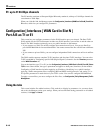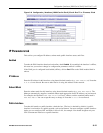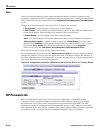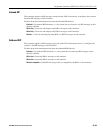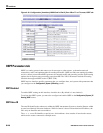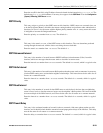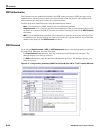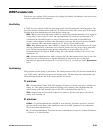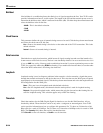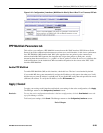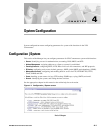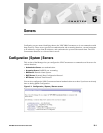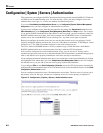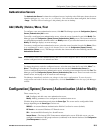
3 Interfaces
3-24
VPN 3000 Concentrator Series User Guide
Buildout
Line buildout is a conditioning factor that limits loss of signal strength on the line. Your T1/E1 carrier
provides information on how to set this option. The length of the line and the transmit power across it
determine the buildout value, which is measured in decibels (dB). Click the drop-down menu button and
select the buildout value for the line:
-0.0 dB = This is the default selection.
-7.5 dB
-15.0 dB
Clock Source
This parameter defines the type of transmit timing source to be used. Click the drop-down menu button
and select the clock source for this line:
Line = Source of transmit timing is the device on the other end of the T1/E1 connection. This is the
default selection.
Internal = Source of transmit timing is internal.
Data Inversion
Check the box to apply data inversion, which inverts all signals coming into and out of the interface (i.e.,
it turns ones to zeroes and vice versa). The box is not checked by default. You must enable data inversion
if you use
AMI line coding. You may need to enable data inversion if you are experiencing errors on the
T1/E1 line, especially when using
SF/D4 line framing. If you enable data inversion here, be sure the other
side of the WAN connection is also using data inversion.
Loopback
Loopback testing is used to diagnose problems in the network: a device transmits a signal that passes
through the network and returns to the device that sent it. This selection sets the WAN port to respond
appropriately to the transmitted signal. Click the drop-down menu button and select the loopback mode
and configuration for this WAN port:
None = This port is not in loopback mode (the default selection).
Line = Set line loopback mode, which means that the entire packet is used for loopback testing.
Payload = Set payload loopback mode, which means that only the data and not the framing bits are
used for loopback testing. This selection applies only to ESF line framing.
Timeslots
Check the numbers for the DS0 (Digital Signal 0) timeslots to use for this WAN interface. All are
checked by default. These timeslots can be in any order—contiguous or noncontiguous. Your T1/E1
carrier provides information on how to configure this parameter. For T1, there are 24 timeslots of 64
Kbps each, for a total of 1536 Kbps. For E1, there are 31 timeslots of 64 Kbps each, for a total of 1984
Kbps. The
Currently: field shows the total for checked timeslots.
Click
Clear All to clear all timeslots, or Set All to set all timeslots.



